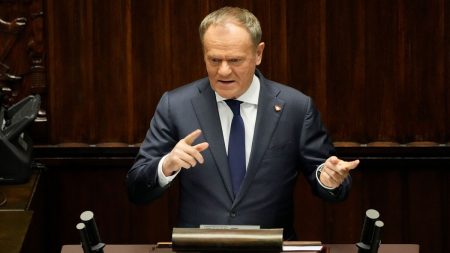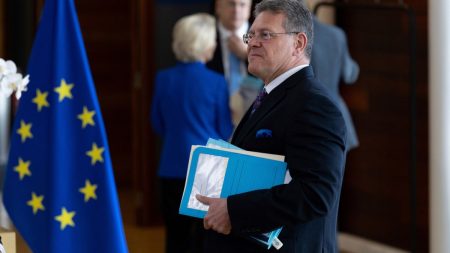The European Commission has recently defined the framework for a significant new emissions trading scheme, known as ETS2, which is set to begin in 2027. This controversial initiative aims to cap greenhouse gas emissions from fossil fuels used in road transport and heating to just over a billion tonnes per year. As part of this new scheme, suppliers will compete in a market for carbon emissions allowances, which experts believe could lead to increased fuel prices for consumers unless effective governmental measures are implemented to reduce demand for fossil fuels. The context for this policy is the EU’s existing emissions trading system, initiated nearly two decades ago, which was designed to impose costs on carbon emissions from industrial operators but has struggled to address emissions in transportation and buildings adequately.
The cap established by the European Commission represents a critical first step toward meeting the EU’s ambitious climate targets. The total emissions across the EU were around 3.2 billion tonnes last year, reflecting a modest reduction of 8%. The new scheme seeks to build on the success of the established ETS system, which contributed to a significant reduction in coal usage in favor of renewable energy sources such as wind and solar power. However, a report highlighted that emissions from buildings only saw a minor decrease of 12% from 2015 to 2022 despite various regulations aimed at improving energy efficiency. In contrast, road transport, accounting for about 20% of the EU’s overall emissions, has shown little improvement, emphasizing the urgency for a targeted approach to these stubbornly high emissions.
The ETS2 plan is designed with long-term goals in mind, aiming for an annual reduction in the emissions cap to facilitate a decrease of 42% from 2005 levels by 2030. Eleanor Scott from the think tank Carbon Market Watch noted its critical role in achieving the EU’s 2040 climate objectives, especially in terms of making renewable energy more economically favorable compared to fossil fuels. The upcoming proposal for legally binding emissions targets for 2040 is anticipated, with expectations set at a reduction of at least 90% below 1990 levels. The urgency for the ETS2 framework lies in its potential to create incentives for reducing emissions from sectors that have been historically resistant to change, such as buildings and transport.
Predicting the precise financial implications of the ETS2, particularly regarding fuel prices at the pump and heating costs, remains complicated. The preliminary estimate suggests that a carbon price of around €45 per tonne of CO2 could increase petrol prices by about 10 euro cents per liter. However, this pricing may fluctuate dramatically depending on advancements in home energy efficiencies and transitions to electric mobility, which must proceed alongside a decreasing supply of allowances in the market. Recognizing the potential backlash against rising living costs reminiscent of the 2018 “yellow vests” protests in France, lawmakers have proposed a parallel Social Climate Fund (SCF) to channel some of the anticipated auction revenues back to underserved households.
Given the cautious reception of potential public backlash, the European Commission acknowledges the need for careful management of this initiative. There is a shared understanding that ETS2 should not be viewed as a standalone solution, but rather as part of a broader strategy that includes proactive governmental measures to mitigate high prices. Scott emphasizes the importance of member states preparing effectively for the transition, including implementing complementary initiatives aimed at emissions reductions that can alleviate the market pressures leading to price increases. Effective planning and communication will play an essential role in maintaining public support as the scheme rolls out.
Support for the ETS2 initiative appears to be mixed, with opposing sentiments emerging among various member states of the European Union. The Commission has faced challenges in ensuring universal compliance, as evidenced by infringement proceedings initiated against most member states for failing to align national legislation with the revised ETS Directive. Ensuring the success of ETS2 will depend significantly on devising well-considered social climate plans that prioritize public engagement and target assistance to those most affected by energy and transport costs. The successful allocation of over €200 billion anticipated from ETS2 revenues will be crucial, particularly to ensure fairness and to garner support for the overarching climate goals throughout the EU landscape.










